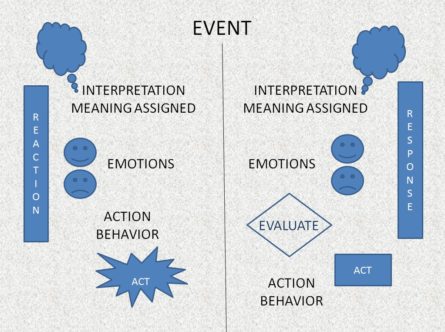Reaction versus Response

Many a times we use the words reaction and response interchangeably. There is significant difference between these two from a psychological and behavioral perspective.
I usually have a discussion on this topic with almost every client in my professional practice. Usually they assume that they both are one and the same. And then I explain the actual difference on the ground, and invariably it comes as a surprise to them.
Let us understand this process in a bit more detail.
A reaction is usually instantaneous. An event occurs, the event is processed in your mind, that is, a meaning is associated to the event or an interpretation occurs, and based upon the interpretation you experience a set of emotions, and you immediately act or behave in a certain way.
Before you act or behave, when you are able to consider and evaluate your interpretation or the meaning that you assign to the event, and also evaluate the repercussions of your actions or behavior on yourself as well as your environment, and take a conscious call about what needs to be done and then take action, then this would be a response.
I usually tell my clients, the difference between a reaction and a response is minimum 30 seconds. The time it takes to make that conscious decision and choice. Of course it can take more as well.
Sometimes in life threatening situations, dangerous situations etc, your reactions could be life saving. But in all other situations, a response would be more appropriate and helpful compared to a reaction.
It might be surprising to know that the actual action chosen could still be the same in both the pathways. But when we evaluate the action and still choose the same action it would be a response and our subsequent emotions regarding that behavior of the repercussions of it would be further more manageable and less damaging than a reaction.
Let’s take an example here. Lata is the mother of 3 year old Dakshi. One day when Lata was entertaining neighbors and friends, Dakshi wanted her attention. She calls out to mum, throws a tantrum etc, but her mum is not giving her full attention as she would like. So to get her mom’s attention, she picks up her mom’s mobile and throws it down on the floor. Lata sees this and is infuriated and screams at the child, picks the child up, takes her to her nanny in the other room and leaves her there angrily.
Later in the day, once her guests had left, Lata feels guilty and sorry for the child, goes back to her child and profusely apologizes.
Let’s look at another pathway to the same scenario. The child throws her mother’s mobile down, Lata sees this, and is angry and furious. But she takes a moment to calm herself down. She evaluates how the child needs to be reprimanded for her behavior. She makes a choice, and strongly tells the child that this is bad behavior and that she needs to be back in her room. She picks up the child takes her to her nanny in the other room and leaves her there sternly.
Later in the day, once her guests had left, she feels sorry for the child but not guilty about her own actions. She goes back to her child and explains to the child why her behavior was unacceptable and what was expected of her. The child learns discipline and proper behavior.
If you look at these two approaches to the same scenario you can clearly see that in the first one Lata reacted and so she ended feeling guilty later on. She is not able to effectively teach the child discipline and appropriate behavior.
In the second approach Lata chooses to sternly tell the child that it is wrong behavior, and later on she doesn’t feel guilty about it and is able to handle the disciplinary process in a better manner.
This concept can be used in any interpersonal situations as well as intra-personal (within yourself) situations as well. Applying this concept can make your communication more effective, impact relationships positively and over all enhance your well being.
About the Author:
Kala Balasubramanian is certified Counselling Psychologist/Psychotherapist with a Masters in Counselling and Psychotherapy, Diplomas in Counselling and has further certifications specializing in couple/marriage/relationship counselling and family counselling. As a professional counsellor she provides a supportive, understanding, professional and confidential environment to work with clients – Individuals and Couples explore their emotions, help them understand and manage their challenges, relationships and stress better.
